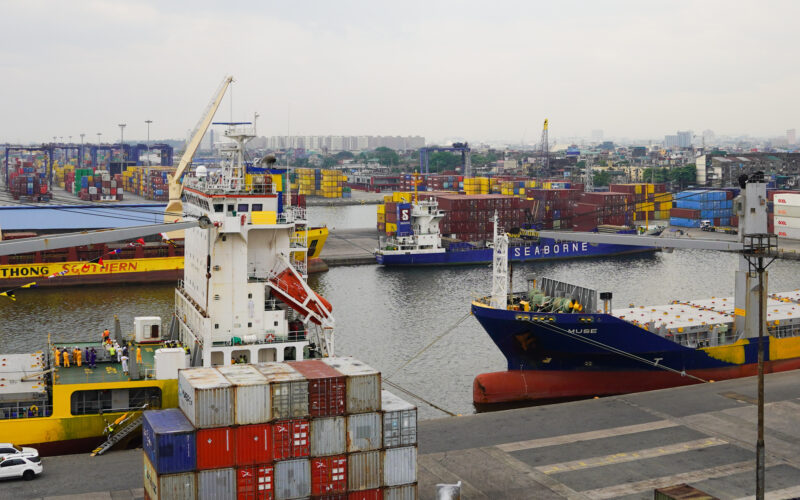-
The Philippine Inter-island Shipping Association is against a Maritime Industry Authority proposal granting Philippine-registered ships the flexibility to engage in both domestic and overseas operations
-
PISA is asking the Senate to look into the policy, claiming it is “being unreasonably fast-tracked and lacking of governance and accountability”
-
The proposed MARINA policy is in keeping with the Public Service Act which opened up shipping to 100% foreign ownership
-
With the proposal, foreign shipowners will put pressure on domestic shipping firms, forcing them to cut costs, trade on small secondary routes or to cease operation, PISA said
The Philippine Inter-island Shipping Association (PISA) is against a Maritime Industry Authority (MARINA) proposal granting Philippine-registered ships the flexibility to engage in both domestic and overseas operations.
PISA is asking the Senate to look into the policy, claiming it is “being unreasonably fast-tracked and lacking of governance and accountability.”
The draft MARINA memorandum circular (MC) provides the rules and regulations on the grant of operational flexibility to Philippine-registered ships. In particular, it will allow all Philippine-registered ships granted with a Certificate of Ship Operational Flexibility to ply in and out of Philippine territorial waters without securing special permit from MARINA.
The proposed policy is pursuant, among others, to Republic Act (RA) No. 11659, or An Act Amending Commonwealth Act No. 146, otherwise known as the Public Service Act (PSA), which relaxes foreign ownership in certain industries. Under the law passed in 2022, domestic shipping is no longer a public utility, opening it up to 100% foreign ownership.
READ: MARINA allows foreign investors to engage in domestic shipping
In a letter dated July 31 to Senator Raffy Tulfo, chairman of the Senate Committee on Public Services, PISA said: “Based in the guise of promoting and attracting foreign investments and warranting vessels to be Philippine registered, the fact remains that with the passage into law of RA 11659 allowing for 100% foreign ownership is tantamount to giving control, of a very important industry, to foreigners and slowly killing the Philippine domestic shipping industry.”
Even prior to the signing of RA 11659, PISA has opposed the removal of transportation services, including domestic shipping, from the list of public utilities, saying this will adversely affect the riding public and will not necessarily lower shipping cost.
READ: Retain foreign ownership restriction in domestic shipping, industry associations insist
PISA in its letter said foreign shipowners are likely to invest in and have modern technologies, larger ships, and stronger financial position to charge lower rates.
“The ability of these foreign shipowners to reduce their marginal costs and cross-subsidize their Philippine operations more so now with their capability to flexibly operate both domestic and international will put pressure on the profitability of domestic shipping firms, forcing them to cut on costs, trade on small secondary routes or to cease operation,” PISA pointed out.
“Economic liberalization goes much deeper than shipping costs or influx of foreign investments or ownership but rather merits a purposeful investigation of greater issues such as national security, the strengthening of the Philippine merchant marine, the assurance of meaningful reforms in infrastructure i.e. ports and roads, and the capability of our government to protect its national sovereignty,” PISA added.
The association said MARINA never presented to stakeholders any studies nor data to show if such “operational flexibility” has been practiced globally and has been successful, its impact on national security, guidelines on how trade will be determined nor monitored in terms of tax remittances, how government will increase its revenues, how local seafarers will not be “short-changed” in terms of remuneration and work standards, among other things.
Moreover, while public consultations have been held, PISA said “oppositions raised were never considered nor did MARINA exert any effort on how ‘oppositions’ were properly addressed.”
“Time and again, whenever public consultations were held, there has never been any follow-through. Stakeholders were never provided with the minutes of the consultations, discussions held were never documented nor posted in public platforms and on how oppositions raised at the consultation were addressed nor resolved. Because more often, such oppositions were never truly resolved,” PISA said.
“Instead of developing and strengthening the domestic shipping industry as what is its mandate, MARINA would rather put the control of the local shipping industry into the hands of foreign investors who are neither obliged nor share a sense of commitment to our country that in times of national disasters or national calamities or worse in times of war may always opt to abandon or leave,” PISA claimed.
PISA earlier said “there is more than enough competition in the domestic shipping industry” and that opening up the industry to foreign players will not ensure lower logistics costs.
It explained that the high cost of domestic shipping is because of the high cost of doing business, which is due to ships being unable to attain economies of scale because of lack of trade in a particular port to support a larger ship; lack of good and efficient port infrastructure; and trade and production practices that prevent shipping in larger quantities.
Moreover, the Philippine shipping industry is an important contributor to national security in times of national disasters, response and reconstruction, potential conflict over Philippine waters, smuggling, drugs, illegal fishing, and piracy.
Aside from the proposed MC on operational flexibility, MARINA already issued last year its guidelines that allow foreign nationals to enter the domestic shipping industry under MC No. DS-2023-02, and has also revised its rules and regulations on the accreditation of domestic shipping operators and firms/entities to allow foreign players under MC DS-2023-03. – Roumina Pablo









